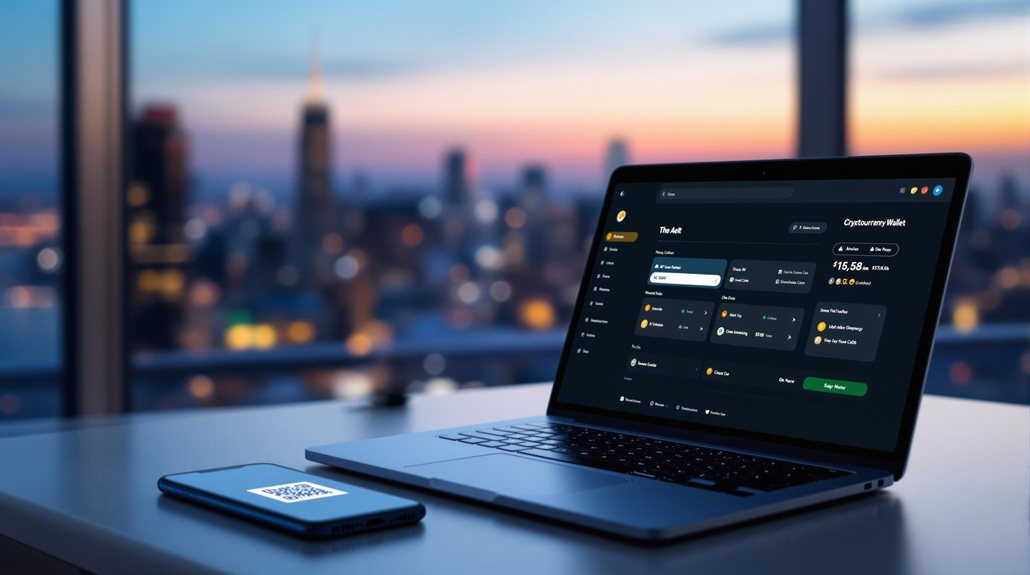A Bitcoin spot ETF is a new investment fund that lets people buy and sell Bitcoin through regular stock exchanges without owning actual cryptocurrency. These funds hold real Bitcoin in secure digital vaults and are managed by professional investment companies under government oversight. Investors can purchase shares through their standard investment accounts instead of dealing with crypto wallets or exchanges. The first 11 Bitcoin spot ETFs launched in January 2024, marking a significant shift in how people can access Bitcoin investing.

A Bitcoin spot ETF is a new investment fund that lets people buy and sell Bitcoin through regular stock exchanges. Unlike buying Bitcoin directly, these ETFs hold the actual digital coins in secure storage vaults. When investors buy shares of the ETF, they're getting ownership of a specific amount of Bitcoin that's being held by the fund. The first 11 spot ETFs began trading on January 11, 2024.
These ETFs are managed by professional investment companies and are overseen by government regulators like the Securities and Exchange Commission (SEC). The managers work with special companies called custodians who keep the Bitcoin safe in digital storage. They also make sure the ETF's price stays in line with Bitcoin's market price by following something called the CME CF Bitcoin Reference Rate. The performance of these funds is directly linked to Bitcoin's actual market price.
One of the main things that makes Bitcoin spot ETFs appealing is how easy they are to use. Investors don't need to worry about setting up cryptocurrency wallets or dealing with crypto exchanges. They can just buy and sell shares through their regular investment accounts, just like they would with stocks. This has opened up Bitcoin investing to many more people who might have found it too complicated before. The simplified asset management approach particularly appeals to traditional investors who prefer familiar investment tools.
The ETFs also bring more stability and organization to the Bitcoin market. They're carefully regulated, which helps protect investors, and they can make it easier to buy and sell large amounts of Bitcoin. In some places, they might even offer tax advantages compared to owning Bitcoin directly.
However, these ETFs aren't without their risks. Bitcoin's price can still go up and down dramatically, and the ETF's value will follow those changes. The companies running the ETFs charge fees for managing the fund, which can reduce how much money investors make. Sometimes, the ETF's price might not perfectly match Bitcoin's price due to various market factors.
There are also concerns about keeping the Bitcoin safe. While the custodians use high-level security measures, there's always a risk of cyber attacks. The rules around cryptocurrency investments are still changing, too, which means new regulations could affect how these ETFs operate in the future.
Professional fund managers handle all the technical aspects of owning Bitcoin, from secure storage to price tracking. They follow strict rules set by financial authorities to make sure everything's done properly. This structure has made Bitcoin investing more accessible to regular investors while adding layers of security and oversight that weren't available before.
Frequently Asked Questions
How Do Bitcoin Spot ETFS Affect Cryptocurrency Market Volatility?
Bitcoin spot ETFs have mixed effects on market volatility. While they can cause short-term price swings when they're first launched, they might help reduce long-term volatility.
That's because institutional investors, who typically make more stable, long-term investments, can now access Bitcoin more easily. The ETFs also improve price discovery and market liquidity, which can help stabilize prices over time.
However, large ETF inflows and outflows can still create price fluctuations.
What Minimum Investment Is Required for Bitcoin Spot ETF Trading?
The minimum investment needed for Bitcoin spot ETF trading varies by brokerage platform.
Most brokers don't have specific minimums, but investors typically need enough money to buy at least one share.
Some platforms, like Robinhood, allow people to buy fractional shares, making it even more accessible.
While account minimums are generally low or zero at major brokers like Fidelity and Charles Schwab, the actual investment amount depends on the ETF's current share price.
Can Bitcoin Spot ETFS Be Included in Retirement Accounts?
Bitcoin spot ETFs can be held in certain retirement accounts, but there's still uncertainty around their inclusion.
While they're accessible in traditional IRAs and Roth IRAs through brokerage platforms, most 401(k) plans don't currently allow them.
The Department of Labor has expressed concerns about crypto in employer-sponsored retirement plans, and plan managers must be careful due to strict fiduciary rules.
Some specialized crypto IRAs do offer Bitcoin investment options.
Are Bitcoin Spot ETF Holdings Insured Against Theft or Loss?
Bitcoin spot ETF holdings aren't covered by FDIC insurance like bank accounts.
However, most custodians (like Coinbase and Gemini) have private insurance against theft and criminal acts.
Brokerage accounts holding these ETFs are protected by SIPC insurance for up to $500,000, but this only covers broker failure, not drops in Bitcoin's value.
Each custodian has different insurance policies, and the specific coverage details vary by ETF provider.
How Do Spot ETF Fees Compare to Directly Buying Bitcoin?
Spot Bitcoin ETF fees typically range from 0.15% to 1.5% annually, with most charging around 0.20% to 0.25%.
In comparison, buying Bitcoin directly on crypto exchanges usually costs 0.1% to 0.5% per trade.
While ETFs have ongoing annual fees, direct Bitcoin purchases only involve one-time trading fees and optional hardware wallet costs ($50-$200).
ETFs also include extra costs like bid-ask spreads and brokerage commissions that don't apply to direct purchases.





